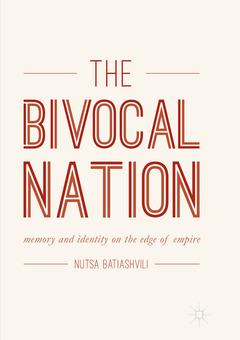Description
The Bivocal Nation, Softcover reprint of the original 1st ed. 2018
Memory and Identity on the Edge of Empire
Author: Batiashvili Nutsa
Language: English
Subjects for The Bivocal Nation:
Publication date: 06-2018
Support: Print on demand
Publication date: 10-2017
Support: Print on demand
Description
/li>Contents
/li>Biography
/li>Comment
/li>
Offers a distinct approach to understanding how geopolitical issues, like Russian-Georgian relations, are made sense of through culturally embedded practices
Fills a gap in the existing literature by exploring the cultural undercurrents of political processes from the anthropological perspective
Offers contributions not only to the field political ethnography, but also to the theory of the nation-state in post-imperial contexts as well as to the nexus of memory and politics




